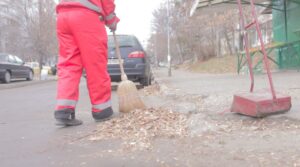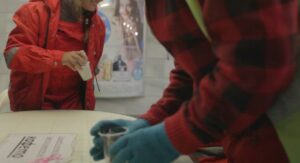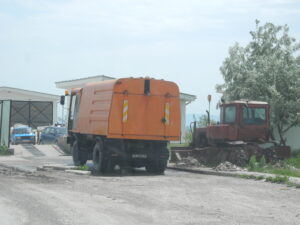Engaged Anthropology Grant: Elana Resnick

While a doctoral student at the University of Michigan, Ann Arbor, Elana Resnick received a Dissertation Fieldwork Grant in 2010 to aid research on “Waste, Work, and Racialization in Bulgaria,” supervised by Dr. Alaina Lemon. In 2016 Dr. Resnick received an Engaged Anthropology Grant to aid engaged activities on “She Writes the Book of How Much We Suffer: Engaging Waste Management Research Participants in Sofia, Bulgaria”.
“She writes the book on how much we suffer.” This was the common explanation among the Romani street sweepers with whom I worked about why I was in Sofia, Bulgaria, cleaning streets, and asking them about their seemingly mundane labor. Despite my insistence that I wasn’t focusing on suffering, this remained a common local understanding of my presence and ethnographic engagement. With the Engaged Anthropology Grant I returned to Sofia, Bulgaria and used collaborative ethnographic film documentation techniques, public presentations, and visual narration in order to share the findings of my dissertation research.

My Wenner-Gren research specifically examined disposal, collection, processing, storage, cleaning, and recycling of waste in Bulgaria, focusing on the capital city of Sofia. Fieldwork addressed relations between informal waste collection (individuals collecting discarded objects for re-use or resale) and formal waste management sectors.
Through participant-observation and interviews with individual trash collectors, employees of trash firms and recycling organizations, environmental and human rights NGOs, governmental agencies, as well as through site visits to landfills, my research addresses the potential for continued life amidst waste and material “death.” Investigating waste through a multi-scale perspective, my dissertation looks beyond dichotomies of dirty vs. clean or animate life vs. inanimate objects to show how personhood, sensory phenomena, and life-death continuums are better understood through the study of waste.

The Engaged Anthropology Grant enabled me to share findings from different aspects of my fieldwork with my variously situated interlocutors so that they could learn about the findings from other participants and sites of my dissertation research. I used interview excerpts, documentary film clips, and photographic images to share my Wenner-Gren research findings with four key populations with whom I worked: 1) Romani waste workers in Sofia, 2) NGO representatives and activists, 3) politicians and policy makers in Bulgaria, 4) Bulgarian anthropologists and academics.
In order to make my results accessible to all of my interlocutors, I shared my findings through oral presentation and video documentation. Having already collaborated on creating over fifty hours of documentary film footage about municipal waste labor, I sat with my former colleagues and shared film clips, oral interview excerpts, and explained the findings I made from our work together.

In response to this, they provided critiques, recommendations, and responses. Most of the women I swept with were surprised to see me in person. They explained that my work with them marked the end of an era since most of our mutual sweeping colleagues had either found “indoor work” or moved abroad. Of the forty-two women with whom I worked sweeping streets, only about ten remained on the job. In practice, this meant that I often had to share my findings one-on-one and using Skype and Facebook as mediums for interaction.
I was able to use my interlocutors’ responses to my findings in order to add narrative text to accompany stills and clips from my film footage that I could share with the other research participants: waste company CEOs, NGO representatives, local politicians, as well as with Bulgarian academics. Since the political landscape of Bulgaria had also changed in the years since I completed fieldwork, I was able to meet with former political representatives now working in other positions. This meant that I shared my findings individually and in small groups, including at the offices of environmental NGOs, in the conference rooms of local landfills, and in the boardrooms of waste management firms with which I worked.

I provided short-form synopses of my dissertation and film in a variety of local venues, which catalyzed further conversations about my findings and the changes since my research ended in 2013. Finally, I was able to share my research findings with local academics and I am currently completing a Bulgarian-language publication about my research findings for a Bulgarian anthropology journal.